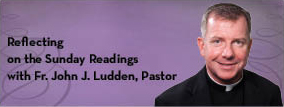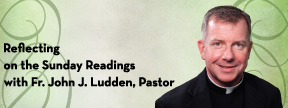
Welcome to the Word & Life Series. In this series, Fr. John Ludden will take the Sacred Scriptures offered at Mass each Sunday and apply them to our everyday lives. As you read Fr. John’s reflection, open your hearts and minds in new ways to God’s Holy Word. St. Paul says “The Word of God is living effective“. So as we journey together in the Word & Life, let us allow the wisdom of God to transform our relationship and our outlook on life, inspiring us to love one another as He has loved us. You are now invited to reflect on the Word of God which is the Way, the Truth, and the Life! Welcome again to the Word & Life!
February 26, 2012
First Sunday of Lent Year B
Genesis 9:8-15
Psalm 25:4-5, 6-7, 8-9
1 Peter 3:18-22
Mark 1:12-15
Changing the Heart ~ A Noble Endeavor
The Season of Lent is here and we are called to conversion. The discipline of Lent — fasting, prayer, and almsgiving, enable us to enter the depths of our souls and to discern God’s will in our lives. Conversion is not simply the changing of the mind, but also the changing of the heart. The mind can simply digress from one thing to another. It is here that opinions are formed and sin reigns supreme. Each Lent we are called to “Metanoia” which means “a change of heart”. A true change of heart brings transformation to the life of the one who commits himself to be converted to Christ in this most holy season.
In today’s gospel, we hear of the temptation of Jesus. Jesus listened to the Spirit of God within himself, and the Spirit led him into the desert where he underwent self-denial. The forty days Jesus spent in the desert enabled Him to look deep within himself. It was in this reality that Satan brought temptation. Jesus, however, resisted this temptation, uniting his heart to the Father in heaven. In this short passage from Mark we also hear that Jesus was “…among wild beasts, and the angels ministered to him.” He had to deal with both the good and the bad. Out of this test, Jesus is seen to call us to repent and believe in the gospel. He calls for a change of heart and surrender to the good news.
Each year we are given an opportunity to turn our lives back to God. We are bombarded with so much today. Temptations pervade our time and our space. Goodness is all around us, but so also is sin. Materialism, indifference, discrimination, the world of sensuality and the undermining of the dignity of life, deter us from living the fullness of life. During Lent, Christ and the universal Church invite us to reflect on our lives and to make a return to God. This is a time to refuse to be mastered by sin and yield to the love of God. The language of the heart allows us to let go of what is nonessential and hold onto what is essential. If we turn our hearts toward God, we can remove the negative influences that bring the stain of sin to each one of us.
Let us reflect on our lives. If there is a person or persons with whom we are in conflict, we are asked to turn away from the temptation of resentment and to grapple with the mystery of God’s mercy and forgiveness. If there is a situation that we are involved in that is seemingly unjust, immoral, or unethical, then we are challenged to transform these broken realities. We live in a world of fragile peace — fragility exists because of sin. However, the answer to prayer for a lasting peace can be found. This hope exists in the dignity and soul of every individual. Peace can be made a reality when we allow the Prince of Peace to speak through us. This is the hope to which we are called!
Prayer
We pray: Turn our minds to you, O Lord. Transform our hearts so that we can return to you in love. Help us to remove the things that hinder your new life and growth. Temptation is all around us — do not let us choose sin over you. You are our only hope and salvation. Let our prayer, fasting and almsgiving lead us to you. Amen.
Reflection Questions
- How are you going to discipline yourself this Lent?
- In what ways will fasting, prayer and almsgiving help you grow closer to Christ?
- Which temptations keep on recurring in your life?
- What ways do you combat such temptations?
- Name some of the situations in your own life which require you to change your heart.
- How are you going to actively transform what is broken in your life or around you?
- What is the ultimate promise God has given to you?
Wisdom of the Fathers
The Lenten season offers us once again an opportunity to reflect upon the very heart of Christian life: charity. This is a favorable time to renew our journey of faith, both as individuals and as a community, with the help of the word of God and the sacraments. This journey is one marked by prayer and sharing, silence and fasting, in anticipation of the joy of Easter…
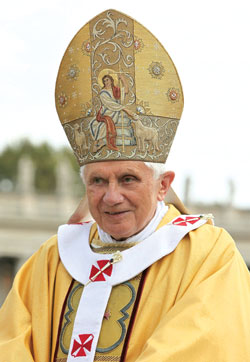 …A society like ours can become blind to physical sufferings and to the spiritual and moral demands of life. This must not be the case in the Christian community! The Apostle Paul encourages us to seek “the ways which lead to peace and the ways in which we can support one another” (Rom 14:19) for our neighbor’s good, “so that we support one another” (15:2), seeking not personal gain but rather “the advantage of everybody else, so that they may be saved” (1 Cor 10:33). This mutual correction and encouragement in a spirit of humility and charity must be part of the life of the Christian community…
…A society like ours can become blind to physical sufferings and to the spiritual and moral demands of life. This must not be the case in the Christian community! The Apostle Paul encourages us to seek “the ways which lead to peace and the ways in which we can support one another” (Rom 14:19) for our neighbor’s good, “so that we support one another” (15:2), seeking not personal gain but rather “the advantage of everybody else, so that they may be saved” (1 Cor 10:33). This mutual correction and encouragement in a spirit of humility and charity must be part of the life of the Christian community…
…These words of the Letter to the Hebrews (10:24) urge us to reflect on the universal call to holiness, the continuing journey of the spiritual life as we aspire to the greater spiritual gifts and to an ever more sublime and fruitful charity (cf. 1 Cor 12:31-13:13). Being concerned for one another should spur us to an increasingly effective love which, “like the light of dawn, its brightness growing to the fullness of day” (Prov 4:18), makes us live each day as an anticipation of the eternal day awaiting us in God. The time granted us in this life is precious for discerning and performing good works in the love of God. In this way the Church herself continuously grows towards the full maturity of Christ (cf. Eph 4:13). Our exhortation to encourage one another to attain the fullness of love and good works is situated in this dynamic prospect of growth.
— Pope Benedict XVI (Lent 2012)
February 19, 2012
Seventh Sunday in Ordinary Time: Year B
Isaiah 43:18-19, 21-22, 24B-25
Psalm 41:2-3, 4-5, 13-14
2 Corinthians 1:1-22
Mark 2:1-12
A Foolish Notion Healed
When we journey through the gospel, we quickly discover the radical nature of Jesus’ message. In today’s gospel, Jesus speaks to the notion of sin and infirmity. It was the belief of ancient Israel that illness or infirmity was the fruit of sin. The Jews of Jesus’ time regarded the person who was suffering as someone affected by their sin or one of their ancestors. When Jesus sees the suffering of the paralytic and the persistence of his friends and their hope for healing, He says, “Child, your sins are forgiven.” The debate that ensues allows Jesus to teach the world. The scribes suggest that Jesus is blaspheming because God alone could forgive sin and Jesus was not God for them. The question Jesus asks confronts their foolish notions, “Which is easier, to say to the paralytic, ‘Your sins are forgiven,’ or to say, ‘Rise, pick up your mat and walk’?” Jesus then commands the paralytic to do the latter. The unthinkable then occurs – he picks up his mat and walks! In this experience of healing, Jesus is teaching that he has power over the notion that binds the paralytic and he heals it. Jesus teaches them that he has the power to forgive sin and to work the miracle of faith.
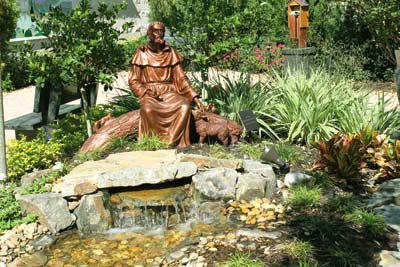 As the Church journeys through time, we are called to realize that this same power remains with us. Mother Church still has the authority to forgive sin and offer healing where suffering exists. Forgiveness is a constant challenge to the Christian way of life. The priest has the power to forgive sin, but the penitent has to be resolved to let go of the sin. Holding on to sin can cripple us. Refusing forgiveness leads to isolation of the one who has sinned and leaves no room to acknowledge another’s conversion and contrition. If we hold on to another’s sin, it holds on to us and leads to resentment. It stands in the way of God and isolates the mercy and love that He is ready to bestow upon our world. Healing takes place when we allow God to work his miracle through us.
As the Church journeys through time, we are called to realize that this same power remains with us. Mother Church still has the authority to forgive sin and offer healing where suffering exists. Forgiveness is a constant challenge to the Christian way of life. The priest has the power to forgive sin, but the penitent has to be resolved to let go of the sin. Holding on to sin can cripple us. Refusing forgiveness leads to isolation of the one who has sinned and leaves no room to acknowledge another’s conversion and contrition. If we hold on to another’s sin, it holds on to us and leads to resentment. It stands in the way of God and isolates the mercy and love that He is ready to bestow upon our world. Healing takes place when we allow God to work his miracle through us.
As people of faith, we need to be persistent in being agents of healing and forgiveness. The people who brought the paralytic to Jesus were persistent and went to great lengths for their friend to encounter Christ and his healing and forgiveness. This is a beautiful image to take to heart as a Church. Sometimes people go to great lengths to show others how they “do not belong to the Church” because of their past or present lifestyle and remind them they are outside of the Church’s graces. Would not it be more productive and Christ-like to go to great lengths in showing the sinner how he or she can belong? The language of Mother Church is that of transformation and redemption. Christ did not intend his people to remain in sin. Rather, Christ intends everyone to walk in the light of his truth and to be reconciled and healed by our heavenly Father. We have the power within each one of us to initiate forgiveness, mercy and healing, and to continue Christ’s work on earth!
Prayer
We pray: Heavenly Father, consume us with the power of your love. Allow your initiative to bring forgiveness and be inscribed upon our hearts. Let your mercy, truth, forgiveness and healing, flow forth from us like a never-ending stream. May Christ’s example shape our lives. Amen.
Reflection Questions
- Do you believe that God punishes sin through making others suffer?
- What does Jesus teach us about this approach?
- What in your life needs to be healed?
- What are the burdens that weigh you down?
- Name some of the foolish notions in your life that contradict God’s will for you.
- How is God challenging you to move beyond some of these notions?
- In what ways are you going to aid others in knowing God’s healing presence?
- Where does forgiveness need to be experienced in your life?
Wisdom of the Fathers
The Saints & You
“Lord, make me an instrument of your peace.
Where there is hatred, let me sow love;
where there is injury, pardon;
where there is doubt, faith;
where there is despair, hope;
where there is darkness, light;
and where there is sadness, joy.
O Divine Master, grant that I may not so much seek
to be consoled as to console;
to be understood as to understand;
to be loved as to love.
For it is in giving that we receive;
it is in pardoning that we are pardoned;
and it is in dying that we are born to eternal life.”
— St. Francis of Assisi (1181-1226)
February 12, 2012
Sixth Sunday in Ordinary Time: Year B
Leviticus 13:1-2, 44-46
Psalm 32:1-2, 5, 11
1 Corinthians 10:31-11:1
Mark 1:40-45
Reach out and touch the leper clean
As we examine the Sacred Scriptures of today’s liturgy, we discover a startling contrast. Both the first reading from the Book of Leviticus and the gospel reading from Mark deal with the disease of leprosy. Leprosy was a deadly disease in Jesus’ day. The disease attacks the nerves and skin, which leads to a loss of feeling. In some cases the extremities of the body waste away. Leprosy is extremely contagious. During Jesus’ time people who fell prey to leprosy would die from this terrible affliction. Indeed a leper at the time of Jesus was condemned to a life of loneliness, forced solitude and separation from their family unit. In the Book of Leviticus the leprous were asked to humiliate themselves neglecting their appearance and shouting out, “Unclean, unclean!” This reading tells us the leper would be cast aside by the priest who makes the declaration that the person is unclean.
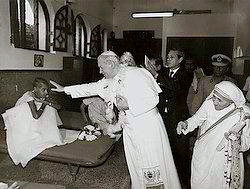 It is not surprising the leper in today’s gospel yearned to be healed. What is surprising about this encounter is that the leper had the courage to break the prescribed laws to ask Jesus’ healing. Jesus’ response also goes against the prescribed law. If a Jew touched a leper, it was said to make him unclean as well as putting him at risk of catching the disease. Jesus’ mercy transcends the observance of the law, the fear of contracting the disease and risk of social rejection. The compassionate way in which Jesus reaches out and touches the leper shows the world that God wants to bring healing and restoration. When the leper is made clean, he is restored to a rightful place in society and is returned to his family and community of faith. He is told to continue with prescriptions of the law of Moses in which he presents himself to the priest as one cleansed in order to be returned to his community. The healed man is also told to keep quiet about this, but his sheer excitement and healing urges him to tell everyone. The miracle worked in the cleansed man’s life, leads others to seek out the presence of Jesus in order that they be healed.
It is not surprising the leper in today’s gospel yearned to be healed. What is surprising about this encounter is that the leper had the courage to break the prescribed laws to ask Jesus’ healing. Jesus’ response also goes against the prescribed law. If a Jew touched a leper, it was said to make him unclean as well as putting him at risk of catching the disease. Jesus’ mercy transcends the observance of the law, the fear of contracting the disease and risk of social rejection. The compassionate way in which Jesus reaches out and touches the leper shows the world that God wants to bring healing and restoration. When the leper is made clean, he is restored to a rightful place in society and is returned to his family and community of faith. He is told to continue with prescriptions of the law of Moses in which he presents himself to the priest as one cleansed in order to be returned to his community. The healed man is also told to keep quiet about this, but his sheer excitement and healing urges him to tell everyone. The miracle worked in the cleansed man’s life, leads others to seek out the presence of Jesus in order that they be healed.
The Sacred Scriptures remind us that we all belong to God. The heavenly Father does not want us to be separate or discriminated against. Neither does God want us to suffer. Every time someone is healed in the gospel, it is a statement of God’s intention to heal, restore, forgive and make whole the dignity of the human person. Leprosy exists today in developing countries and is kept under control with the use of drugs. However, there are things that create “an emerging leprous reality”. A.I.D.S. has appeared as the new pandemic destroying many lives in poorer countries. All across the continent of Africa countless people contract HIV and continue to infect others by having sex. While it is possible for people to live a long life when they become positive with the help of medication, there are few resources provided and thousands upon thousands continue to die from other infections brought on by a weakened immune system. The stigma of living with this reality brings isolation to many of our African brothers and sisters.
As we examine the state of society today, we encounter “leprous” attitudes towards individuals and certain groups. Discrimination of all kinds adds to this emerging severance of human relationships. The poor are neglected and looked down upon. The immigrant finds it increasingly difficult to find a place to call a home. People of faith are increasingly attacked by structural sin, which allows the liberal minority to legislate and discriminate against them. People are no longer free to express their faith in public forums. Indeed, many are penalized for taking part in such religious practices. Actions such as President Obama’s Administration to force religious institutions to provide provisions in healthcare that go against their religious beliefs lead to an increasing isolation as our religious freedom and liberty is slowly being eroded and taken away from us. As Catholic Christians, we are called to reach beyond ourselves and touch the painful realities of the world. The dignity of the human person can be made sacred by the choices that we make today as we seek religious freedom and to help people find their place of belonging in the midst of a secular world.
Prayer
We pray: Heavenly Father, inspire us to bring your healing and dignity to those who feel they do not belong. Give us the courage to face the unknown and fears that keep us from loving others. Let your love be our love, your mind our mind, your heart our heart. May our lives become the song of the Spirit. Amen.
Reflection Questions
- Why does Jesus will that the leper be made clean?
- What are the risks Jesus is willing to take in healing this man?
- How does the leper respond to the healing he received?
- Name the equivalent of the disease of leprosy today both physically, emotionally and spiritually.
- What part are you willing to take in dealing with the “leprous” condition of society?
- What are the risks involved in confronting discrimination and painful situations?
- What is God asking you to do?
The Feminine Genius
“In the developed countries there is a poverty of intimacy, a poverty of spirit, of loneliness, of lack of love. There is no greater sickness in the world today that that one.”
“As far as I am concerned, the greatest suffering is to feel alone, unwanted, unloved. The greatest suffering is also having no one, forgetting what an intimate, truly human relationship is, not knowing what it means to be loved, not having a family or friends.”
“When I look around and see the poor suffering from social and emotional alienation, I understand how Christ can feel sad to see himself alienated in them. The alienation that the poor suffer is the alienation Christ suffers.”
— Blessed Teresa of Calcutta 1910-1997
February 05, 2012
Fifth Sunday of Ordinary Time: Year B
Job 7:1-4, 6-7
Psalm 147:1-2, 3-4, 5-6
1 Corinthians 9:16-19, 22-23
Mark 1:29-39
A Divine Helping Hand
We encounter a very human predicament in today’s gospel. Jesus and his disciples fulfill their Jewish duties of attending synagogue where they are at prayer and worship, but they still must deal with the realities of life. No matter how they attend to worship, illness is still part of their existence. We find Simon’s mother-in-law ill with a fever — she appears to be suffering. When Jesus encounters her suffering, he reaches out his hand to help her and alleviate her distress. We also are told about people who are ill or possessed who were brought to Jesus. He cures these people. Jesus’ acts of healing communicate God’s initiative of compassion and redemption. The Book of Job deals with the experience of human suffering. Job despairs with the lot that he is given, but he realizes in the end that God never abandons him. God does not intend suffering, rather God offers us healing through His Son. Jesus’ purpose is to bring us to a knowledge and love of the Father in the midst of everyday life.
 Theologians have debated the question of suffering through the centuries. None of them has ever been able to give an adequate response to the problem of suffering and evil. Every human being who has ever lived has, in some way or another, been exposed to suffering. Personal suffering or watching another suffer brings us to the depths of our soul and causes us to ask the question “why?” While we will never know the answer as to the “why” of suffering, the gospel sheds light on the “where”, the presence of God in the midst of suffering. God, through Jesus Christ, offers us a divine helping hand when we suffer. When we call upon the name of Jesus through our trials and through our joys, He is there. When Christ encounters people who are suffering, he heals their brokenness — they receive God’s healing when they ask Jesus, in faith, to heal them. God always responds in a compassionate way. We might well ask, why then must I watch someone that I love die? Is it that God has not answered my prayer? Maybe God’s response to the request of healing is to allow someone to leave this world and enter paradise rather than to continue in misery and pain.
Theologians have debated the question of suffering through the centuries. None of them has ever been able to give an adequate response to the problem of suffering and evil. Every human being who has ever lived has, in some way or another, been exposed to suffering. Personal suffering or watching another suffer brings us to the depths of our soul and causes us to ask the question “why?” While we will never know the answer as to the “why” of suffering, the gospel sheds light on the “where”, the presence of God in the midst of suffering. God, through Jesus Christ, offers us a divine helping hand when we suffer. When we call upon the name of Jesus through our trials and through our joys, He is there. When Christ encounters people who are suffering, he heals their brokenness — they receive God’s healing when they ask Jesus, in faith, to heal them. God always responds in a compassionate way. We might well ask, why then must I watch someone that I love die? Is it that God has not answered my prayer? Maybe God’s response to the request of healing is to allow someone to leave this world and enter paradise rather than to continue in misery and pain.
Through the life of Jesus Christ in the gospels, we get glimpses into the mind of God, but we will never fully know the mind of God. All we can do is reflect and pray. We are called to discern in order to know what God intends. The great work of the Church, therefore, is evangelizing the broken and bringing Jesus’ mission of healing to the world. What we do know is that Jesus was no stranger to suffering. Suffering confronted him, he recognized it and transformed it. Likewise, he knew what suffering was all about. He himself suffered ridicule, rejection, humiliation, the agony and the scandal of the cross, and even death itself. However, that too was transformed through the gift of resurrection. We too are constantly reminded in the Mass that we are people of the resurrection, called to share in that same hope!
Prayer
We pray: Heavenly Father, give us a helping hand when we encounter suffering in our lives. Help us to understand your purpose. Reveal yourself in our lives so that we can know your truth and compassion. Whenever we despair, offer us the hope that is truly ours. Bring your healing to the harsh realities of life — mend broken hearts, restore our faith and bring us to the joys of salvation. Amen.
Reflection Questions
- Why do you think people suffer?
- In what ways have you experienced suffering?
- Where have you experienced God in the midst of the trials of your life?
- What suffering exists in the world?
- How did Jesus respond to suffering of the world?
- When considering the event of Calvary, why does Jesus understand the depth of the suffering of humanity?
- How will you respond to such suffering?
- How do you offer hope in times of trial?
The Feminine Genius
“One day, I saw two roads. One was broad, covered with sand and flowers, full of joy, music and all sorts of pleasures. People walked along it, dancing and enjoying themselves. They reached the end of the road without realizing it. And at the end of the road there was a horrible precipice; that is, the abyss of hell. The souls fell blindly into it; as they walked, so they fell. And their numbers were so great that it was impossible to count them. And I saw the other road, or rather, a path, for it was narrow and strewn with thorns and rocks; and the people who walked along it had tears in their eyes, and all kinds of suffering befell them. Some fell down upon the rocks, but stood up immediately and went on. At the end of the road there was a magnificent garden filled with all sorts of happiness, and all these souls entered there. At the very first instant they forgot all their sufferings.”
— Diary of Saint Maria Faustina Kowalska, paragraph 153 (Born 1905 – Died 1938)
VIEW January 2012
VIEW 2011 Word & Life

